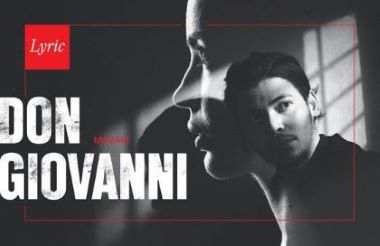
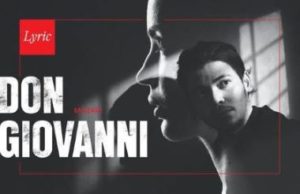 [rating=5]The audience gasps in shock as Giovanni bashes Masetto’s head against a wall and pulls a gun on him. It’s brutal and menacing, for it clearly mirrors the murder Giovanni began the play with and suddenly puts unglamorized violence onstage. And just as quickly, the tension dissipates, as Donna Elvira’s maid flirtatiously slinks up to Giovanni, they pass the gun back and forth, and then run off, Masetto forgotten. In other words, it’s a miraculous resolution that would only ever happen in an opera. That moment perhaps perfectly encapsulates Goodman Theatre artistic director Robert Falls’ revival of the Don Giovanni he debuted at the Lyric five years ago. In the program notes, he and essayist Martha C. Nussbaum express ambivalence about Mozart’s opera that begins and ends darkly but turns into a throwback to the Restoration dramas of a hundred years earlier in between. The mixed tones are hard to get right, no less because viewers are now primed to take the don’s sexual predations seriously. Falls doesn’t pretend to have all the answers, but the revival explores the text more deeply, and musically, it fits perfectly.
[rating=5]The audience gasps in shock as Giovanni bashes Masetto’s head against a wall and pulls a gun on him. It’s brutal and menacing, for it clearly mirrors the murder Giovanni began the play with and suddenly puts unglamorized violence onstage. And just as quickly, the tension dissipates, as Donna Elvira’s maid flirtatiously slinks up to Giovanni, they pass the gun back and forth, and then run off, Masetto forgotten. In other words, it’s a miraculous resolution that would only ever happen in an opera. That moment perhaps perfectly encapsulates Goodman Theatre artistic director Robert Falls’ revival of the Don Giovanni he debuted at the Lyric five years ago. In the program notes, he and essayist Martha C. Nussbaum express ambivalence about Mozart’s opera that begins and ends darkly but turns into a throwback to the Restoration dramas of a hundred years earlier in between. The mixed tones are hard to get right, no less because viewers are now primed to take the don’s sexual predations seriously. Falls doesn’t pretend to have all the answers, but the revival explores the text more deeply, and musically, it fits perfectly.
The play begins with Leporello (Matthew Rose) sulking because he has to keep watch while his master, Don Giovanni (Lucas Meachem in November, Davide Luciano in December) rapes Donna Anna (Rachel Willis-Sørensen). Anna succeeds in preventing Giovanni leaving for long enough to get help from her father, the Commendatore (Mika Kares), but Giovanni murders him and escapes with Leporello. Soon after, they encounter Donna Elvira (Amanda Majeski), whom Giovanni ghosted. Elvira is humiliated when Leporello explains that Giovanni used thousands of women as he pleased, and she leads Donna Anna and Donna Anna’s boyfriend, Don Ottavio (Ben Bliss) in an attempt at revenge. However, Giovanni proves immensely powerful, cunning, and lucky.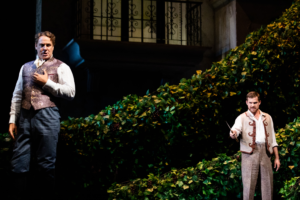
Having seen this production’s premiere, I found the revival to be more cohesive. It’s truly an ensemble, with the characters engaged enough with each other for the entire performance to carry a sense of weight, rather than just the famous last twenty minutes. In the center is not just Don Giovanni, but the criminal duo of Giovanni and Leporello. Carrying shades from Genet’s The Maids, Leporello as interpreted by Rose is a craven sadomasochist who engages in plenty of abuses of his own while shifting responsibility to his master. One of the most brilliant moments in the show belongs to both him and conductor James Gaffigan while singing “Madamina, il catalogo è questo.” The song begins as a cheery cabaletta about Giovanni’s affairs, but suddenly becomes extremely sinister as Leporello says that Giovanni’s preference is for girls who are extremely young and pliant. As for Meachem’s Giovanni, he’s a brute whose clothes do all his charm for him (costumes by Ana Kuzmanic) and who is self-consciously performing during his one aria, the serendade “Deh, vieni alla finestra.” The final trio of the night is not only when we first get to truly enjoy the dark timbre of Meachem’s baritone voice, but also when Giovanni’s twisted relationship with Leporello finally comes fully into itself.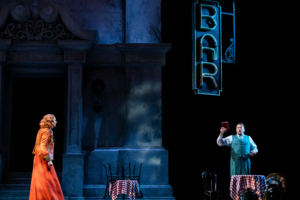
As Anna, Elvira, and Ottavio, Willis-Sørensen, Majeski, and Bliss are remarkable not only for their singing, but for cracking such difficult and frustrating characters. These are, after all, not very competent avengers, due in large part to their own difficulty sustaining their resolve. Soprano Majeski’s Elvira is a live wire who puts together her team through force of personality, but privately comes to the realization that since her own relationship with Giovanni was consensual, her anger at him is motivated by his not returning her still passionate feelings. Her aria “Mi tradì quell’alma ingrata” is a painful moment of self-discovery. At the opposite end of the self-awareness spectrum are Zerlina and Masetto (Ying Fang and Brandon Cedel), the young commoners whose lives Giovanni impulsively turns upside down to demonstrate his power. Ying Fang’s Zerlina naively believes she can manipulate the don, instantly creating a feeling of dread in audience, while Cedel’s Masetto transfers his anger at Giovanni to her because she’s the one he’s able to influence. Dramatically, it’s agonizingly cringe-inducing, and a foreboding irony is reflected in the musical color of their duets.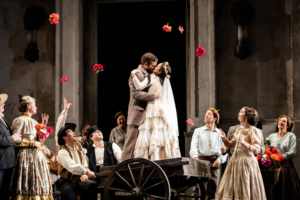
Mozart’s talent for using the human voice to transcend language and express raw emotion found one of its purest expressions in the early duet “Ah, vendicar, se il puoi, giura quel sangue ognor!” in which Donna Anna tells Don Ottavio what 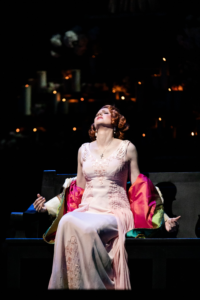 happened to her and her father. Willis-Sørensen’s vibratto doesn’t sound ornamental, but true to the depth of Donna Anna’s feeling. Tenor Ben Bliss’s honey voice might not make for credible vows of revenge, but it does provide Donna Anna with compassion and understanding. It also expresses his own dumbfoundnedness and self-reproach for having been fooled and betrayed by a man he thought was his friend, and Ottavio never really regains his self-confidence. The dramaturge Martha C. Nussbaum’s analysis argues that coping is an underappreciated theme of Don Giovanni, but in this performance, Donna Anna’s last aria, “Crudele? Ah no, mio bene” about her need to heal comes across as the logical climax. It’s not an interpretation that fits the text perfectly and is one that only became apparent five years into the production. During the closing sextet, the characters promise us that divine intervention will always rescue us from seemingly invincible tyrants, which ends the show on a happy note but is a moral the actors cannot deliver any way except sarcastically. Nonetheless, having a chance to re-explore the themes in Lorenzo da Ponte’s libretto is an excellent justification for reviving the production, beyond Mozart’s timeless music. Falls might have done things differently if he was starting from scratch, but the production’s ambiguities, difficulties, and imperfections remain rich territory for each audience member’s own interpretation.
happened to her and her father. Willis-Sørensen’s vibratto doesn’t sound ornamental, but true to the depth of Donna Anna’s feeling. Tenor Ben Bliss’s honey voice might not make for credible vows of revenge, but it does provide Donna Anna with compassion and understanding. It also expresses his own dumbfoundnedness and self-reproach for having been fooled and betrayed by a man he thought was his friend, and Ottavio never really regains his self-confidence. The dramaturge Martha C. Nussbaum’s analysis argues that coping is an underappreciated theme of Don Giovanni, but in this performance, Donna Anna’s last aria, “Crudele? Ah no, mio bene” about her need to heal comes across as the logical climax. It’s not an interpretation that fits the text perfectly and is one that only became apparent five years into the production. During the closing sextet, the characters promise us that divine intervention will always rescue us from seemingly invincible tyrants, which ends the show on a happy note but is a moral the actors cannot deliver any way except sarcastically. Nonetheless, having a chance to re-explore the themes in Lorenzo da Ponte’s libretto is an excellent justification for reviving the production, beyond Mozart’s timeless music. Falls might have done things differently if he was starting from scratch, but the production’s ambiguities, difficulties, and imperfections remain rich territory for each audience member’s own interpretation.
Don Giovanni will continue at the Lyric Opera House, 20 N Upper Wacker Drive, Chicago, thru December 6, with the following showtimes:
November 23: 7:30 pm
November 26: 7:00 pm
November 30: 7:30 pm
December 3: 7:00 pm
December 5: 2:00 pm
December 8: 2:00 pm
Running time is three hours and twenty minutes with one half-hour intermission.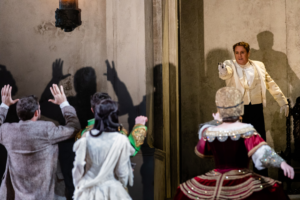
Performances are in Italian with English supertitles.
The Lyric offers parking deals with Poetry Garage at 201 W Madison St. if inquired about in advance. Tickets start at $39; to order, visit LyricOpera.org or call 321-827-5600.
To see what others are saying, visit www.theatreinchicago.com, go to Review Round-Up and click at “Don Giovanni.”

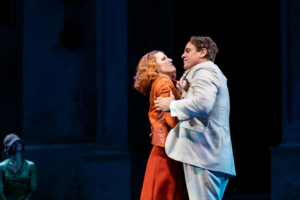





More Stories
“The Firebugs” reviewed by Julia W. Rath
“The Book of Grace” Al Bresloff with another from Paul LIsnek
“The Last Five Years” MILWAUKEE